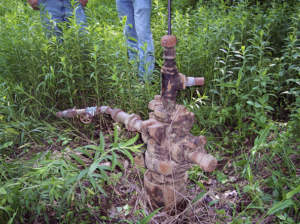
In July, Pennsylvania House Bill 2644 (“HB 2644”) passed in the legislature. The bill allocates the money Pennsylvania is set to receive from the Infrastructure Investment and Jobs Act (“IIJA”) to plug abandoned and orphaned gas wells in the state. To learn more about HB 2644, check out this blog.
Last month, a few weeks before they were due to receive the first sum of money for the project, the Pennsylvania Department of Environmental Protection (“DEP”) received a letter from the United States Department of the Interior (“DOI”) expressing concerns that HB 2644 is not in compliance with some provisions of the IIJA.
The IIJA allots $4.7 billion in state investments to plug orphaned and abandoned gas wells. During the program, Pennsylvania is expected to receive $330,626,000 to plug many of our (estimated) 200,000 orphaned and abandoned wells. We were set to receive the first $25,000,000 investment on October 1, 2022, but the letter from DOI brings that into question.
In the letter, DOI expressed that, depending on its implementation, HB 2644 could be “inconsistent” with provisions of the IIJA. Specifically, DOI is concerned that the grant portion of HB 2644 violates the Build America, Buy America Act, and the Davis-Bacon Act because HB 2644 does not contain requirements for potential grantees that would meet federal standards.
The Build America, Buy America Act requires all projects to receive funds under the IIJA to use only iron, steel, manufactured products, and construction materials made in the United States. Projects can receive a waiver from implementing this provision if any of the following apply: 1) using American-made materials would be inconsistent with the public interest; 2) the materials are not produced in the United States in sufficient and readily available quantities or of a satisfactory quantity; or, 3) using American-made materials will increase the overall cost of the project by more than 25%.
The Davis–Bacon Act requires contractors and subcontractors performing on federally funded projects to be paid at rates set by the United States Department of Labor. The act applies if a project is funded in excess of $2,000 and is for the construction, alteration, or repair of public buildings and works. Starting in January 2023, the wage requirement for contractors and subcontractors will be $16.20 an hour.
If Pennsylvania law is not in compliance with federal law, there are three possible paths forward. In the following scenarios assume DOI gave Pennsylvania the initial $25,000,000 investment on October 1, although it is unclear if that occurred as of October 6, 2022.
In the first scenario, Pennsylvania spends the money in a way that complies with state and federal law. This means that the State would require grantees to pay a minimum wage of $16.20 an hour and only use American-made iron, steel, manufactured products, and construction materials unless a waiver has been granted for the project. However, ensuring these provisions are implemented within the well plugging grant program may require a legislative solution.
The second scenario is that the Pennsylvania legislature fixes this problem with legislation. Three pieces of legislation1HBs 2853, 2854, and 2855 were referred to their respective Committees on September 26, 2022 and no action has been taken on them since. were introduced after DEP received the letter from DOI requiring the use of American-made steel in projects that receive public funding. However, these bills have not moved at all, and no legislation has been introduced to fix the minimum wage problem or require other materials to be American-made. Also, it is unlikely that legislation that isn’t already moving will pass this session because of the limited number of voting days left in the House and Senate.
The final scenario is that Pennsylvania chooses to spend the money in a way that does not comply with federal law. If our leaders choose to take this approach, the outcome is unknown. It is possible that the state will be expected to pay the federal dollars back.
If we are not compliant, we are knowingly giving up federal money that could be used to plug orphaned and abandoned wells which are a significant problem in our state. It would be in the best interest of the residents of the Commonwealth for Governor Wolf and the Pennsylvania legislators to take the letter from DOI seriously and fix the problem now.
- 1HBs 2853, 2854, and 2855 were referred to their respective Committees on September 26, 2022 and no action has been taken on them since.

